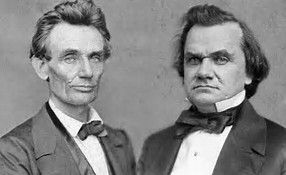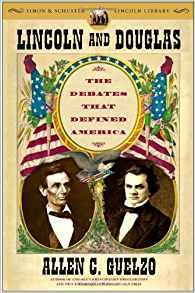
Posted on 09/04/2018 5:07:00 AM PDT by Homer_J_Simpson






















Free Republic University, Department of History presents U.S. History, 1855-1860: Seminar and Discussion Forum
Bleeding Kansas, Dred Scott, Lincoln-Douglas, Harper’s Ferry, the election of 1860, secession – all the events leading up to the Civil War, as seen through news reports of the time and later historical accounts
First session: November 21, 2015. Last date to add: Sometime in the future.
Reading: Self-assigned. Recommendations made and welcomed. To add this class to or drop it from your schedule notify Admissions and Records (Attn: Homer_J_Simpson) by reply or freepmail.

Continued from August 28 (reply #3).



Allen C. Guelzo, Lincoln and Douglas: The Debates that Defined America
Perusing through Harper’s weekly, there is no hint that in three years America will be torn by civil war.
And the article on Salt Lake City was interesting. For America east of the Mississippi, Salt Lake City might as well have been a colony on Mars.
The readers seem to be more concerned with events in Utah than the gathering storm fueled by slavery. Harper's Weekly is, at any rate. There have been at least 3 or 4 long articles about Utah and there are more to come.
The Dred Scott Decision and Bleeding Kansas have faded out as topics. The keen observer of current events might get some sense of the approaching troubles by paying close attention to the Illinois canvass and studying the implications of the words of Lincoln and Douglas.
OSAWATOMIE, KANSAS, Sept . 9, 1858.
DEAR WIFE AND CHILDREN, ALL, — I received Henry's letter of the 21st July a long time ago, but was too sick to answer it at the time, and have been ever since till now. I am still very weak, but gaining pretty well. I was never any more sick. I left the Missouri line about six weeks since; soon after, I was taken down. Things are now very quiet, so far as I know. What course I shall next take, I cannot tell, till I have more strength. I have learned with pain that the flour did not go on, and shall try to send you some money instead of it, so that Mr. Allen may be well paid for the barrel he lent. I can write you no more now, but I want to know how you all get along. Enclose everything to Augustus Wattles, Moneka, Linn County, Kansas, in sealed envelope, with my name only on it. God bless you all!
Your affectionate husband and father.
[JOHN BROWN.]
SOURCE: Franklin B. Sanborn, The Life and Letters of John Brown, p. 478
I wonder what his illness was. I know people were sick all the time in those days from something or other ...
If a letter or diary mentions that a woman “was sick,” it usually means she was giving birth.
According to one source I found there was a worldwide influenza epidemic in 1857-59. That could lay a bunch of people low without generating publicity and Harper’s Weekly articles like a yellow fever or typhus epidemic would.
http://www.bellaonline.com/articles/art7040.asp
That’s very interesting.
OSAWATOMIE, KANSAS, Sept. 10, 1858.
DEAR FRIEND, AND OTHER FRIENDS, — Your kind and very welcome letter of the 11th July was received a long time since, but I was sick at the time, and have been ever since until now; so that I did not even answer the letters of my own family, or any one else, before yesterday, when I began to try. I am very weak yet, but gaining well. All seems quiet now. I have been down about six weeks. As things now look I would say that if you had not already sent forward those little articles,1 do not do it. Before I was taken sick there seemed to be every prospect of some business very soon; and there is some now that requires doing; but, under all the circumstances, I think not best to send them.
I have heard nothing direct from Forbes for months, but expect to when I get to Lawrence. I have but fourteen regularly employed hands, the most of whom are now at common work, and some are sick. Much sickness prevails. How we travel may not be best to write. I have often met the “notorious” Montgomery, and think very favorably of him.
It now looks as though but little business can be accomplished until we get our mill into operation. I am most anxious about that, and want you to name the earliest date possible, as near as you can learn, when you can have your matters gathered up. Do let me hear from you on this point (as soon as consistent), so that I may have some idea how to arrange my business. Dear friends, do be in earnest; the harvest we shall reap, if we are only up and doing.
1 The whistles, etc., mentioned in this note, sent to me from Brooklyn in March, 1858. “Please get for me (if you can) a quantity of whistles such as are used by the boatswain on ships of war. They will be of great service. Every ten men ought to have one at least. Also some little articles as marks of distinction, which I mentioned to you.”
SOURCE: Franklin B. Sanborn, The Life and Letters of John Brown, p. 477
I've seen where Lincoln expressed the same ideal elsewhere, so it was likely a common theme and may help explain how Northerners previously agnostic on slavery flipped to become ardent abolitionists.
So long as slavery remained in the South they were OK with it, but expansion into western territories and even more making all states effectively slave-states, that got their blood boiling.

Yes, that’s an excellent point.
Mr. Lincoln and other abolitionists can thank Mr. Chief Justice Taney for the ability to make that a credible argument.
Disclaimer: Opinions posted on Free Republic are those of the individual posters and do not necessarily represent the opinion of Free Republic or its management. All materials posted herein are protected by copyright law and the exemption for fair use of copyrighted works.